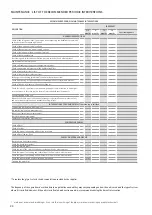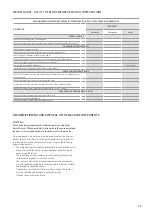
21
MAINTENANCE
ATTENTION
Any cleaning, inspection, control, routine and extraordinary mainte-
nance must be performed by experienced, authorised personnel and
qualified to perform the above tasks. These tasks must be performed
with the machine off and not powered to perfection as prescribed by
M.D. 37/2008.
During the execution of
- Risks of electric discharges;
- Risk of injuries due to the presence of rotating parts;
- Risk of injuries due to the presence of sharp edges and heavy
weights;
- Risks of injuries due to the presence of components containing high
pressure gas;
- Risks of injuries due to high or low temperature components.
- Noise-related risks of the machine functioning (refer to what is de-
clared in the user manual);
- Risks related to the presence of harmful substances in hydronic
circuits.
These tasks must be performed using the appropriate personal
protective equipment, see figure below
Maintenance operations are essential to maintain the refrigerant unit
efficient, from a purely functional point of view and with regard to energy
and safety.
In the absence of specific regulations regarding HFO refrigerants, the
manufacturer prescribes the application of and compliance with that
indicated in the:
- Regulation (EC) No.842/2006- art.3 concerning the “leakage contain-
ment”
- Regulation (EC) No.1516/2007 concerning the “standard leakage
checking requirements” and related national laws implementing the
above European regulations.
ATTENTION
For the unit, the user must provide a system booklet which he must
ensure, or its designee authorised to service the machine, will contain
all required records in order to have a historical documentation of the
unit functioning. The absence of records in the booklet may count as
evidence of lack of maintenance..
PRECAUTIONS TO BE OBSERVED DURING MAINTENANCE
ATTENTION
Maintenance operations can only be performed by authorised techni-
cians
PRECAUTIONS AGAINST RESIDUAL RISKS
MECHANICAL RISKS
- Before opening a machine panel, ascertain whether it is or not firmly
connected to it by hinges;
- In case a piece is disassembled, make sure it is correctly reassembled
before restarting the unit;
- Louvers of the heat exchangers, edges of the components and pan-
els, screws can generate cuts;
- Do not remove the protections from mobile elements while the unit
is running;
- Make sure that the protections of mobile elements are correctly in
place before restarting the unit;
- It is not permitted to walk or place other bodies on the machine;
- Fans, motors and belt drives may be in motion, always wait for them
to stop and take appropriate precautions to prevent their activation
before accessing them;
- Isolate the unit from the mains by means of the external isolator
provided for the insertion of padlocks (up to 3) for blocking in “open”
position.
- Place a sign reading “Do not turn on - maintenance in progress” on
the open isolator
- Equip yourself with the appropriate personal protective equipment
(helmet, insulated gloves, protective goggles, accident-prevention
shoes, etc.)
- Equip yourself with tools in good condition and make sure to have
fully understood the instructions before using them
- For outdoor units, do not perform interventions in dangerous weath-
er conditions such as rain, snow, fog, etc.
- The cooling circuit contains under pressure refrigerant gas: any
operation must be performed by competent personnel in possession
of the authorisations and qualifications required by current laws
ATTENTION
it is forbidden to LOAD the cooling circuit with a refrigerant gas differ-
ent from that indicated. Using different refrigerant gas can
severely damage the unit
- never keep the cooling circuit open, because the oil absorbs humidi-
ty and degrades
- during venting protect yourself against any leakage of fluids at dan-
gerous temperatures and/or pressures
- always use appropriate equipment (extractor, antistatic bracelet, etc.)
when replacing electronic boards
- if replacing a motor, compressor, evaporator, condensing coils or any
other heavy element, make sure that the lifting devices are compati-
ble with the weight to be handled
- in air units with independent compressor compartment, do not
access the fan compartment without having first disconnected the
machine through the isolator on the board and having placed a sign
reading “Do not turn on - maintenance in progress”
- contact the company if changes must be made to the refrigerant,
hydraulic or electric diagram of the unit, as well as its control logic
PREVENTION OF CHEMICAL / FIRE / ENVIRONMENTAL RISKS
- Any intervention on the machine must be performed with “NO
SMOKING”;
- Never disperse the fluid contained in the cooling circuit in the envi-
ronment
- The water circuit may contain harmful substances. Prevent the
contents coming into contact with skin, eyes and clothing. Use the
prescribed personal protective equipment. (chemical risk);
- If there is a need to perform a braze-welding, so with the use of spe-
cial torch with naked flame, the same flame must only be activated
if in the absence of freon gas in the environment and on the cooling
circuit pipes. Inside piping must be “washed” and contain nitrogen
type inert gas. The presence of flame and freon gas decomposes the
same, forming lethal and carcinogenic compounds.
- Hot works require the availability of a Carbon Dioxide (CO
2
) fire ex-
tinguisher. DO NOT USE WATER, leachates could be hazardous for the
discharges; if using water, provide a containment tank.
MAINTENANCE








































